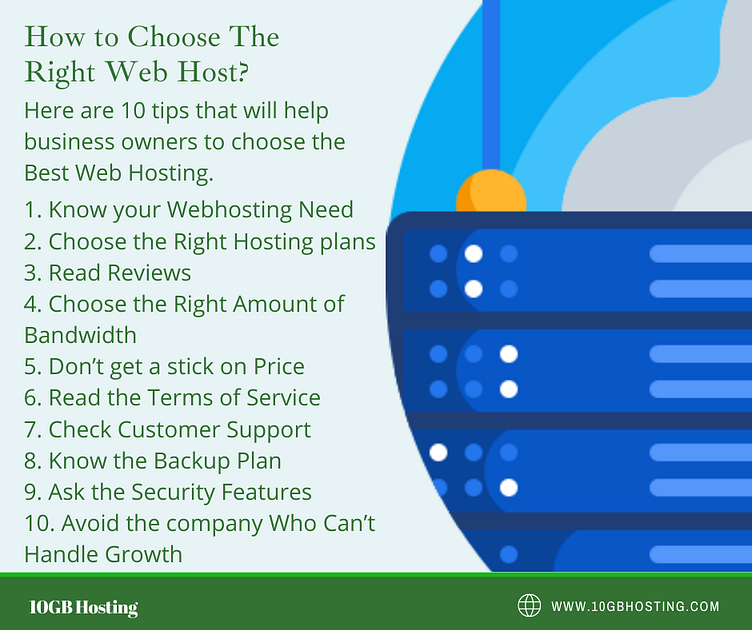How to Choose The Right Web Host?
Here are 10 tips that will help business owners to choose the Right Web Host. 1. Know your Webhosting Need Understanding the needs of your business can help narrow your web hosting options. If you plan to build a website that features video blogging, 24-hour live streaming, and the ability for visitors to register and upload their own videos, your website would require more features than someone who just uses their website as a virtual resume. Websites that receive a lot of daily traffic will likely not function well on a shared server because these servers are designed to accommodate a lot of small websites that have limited demands. 2. Choose the Right Hosting Plans Many small businesses turn to shared hosting as a way to save money, but with the smaller price tag comes a bigger risk of slow website response times. Slow websites turn customers away. An option like a Virtual Private Server (VPS) is slightly more expensive, but it provides a faster, higher quality web performance and delivers a better customer experience. 3. Read Reviews Refer to reputable websites when researching the reliability and reputation of web hosts. Researching a web hosting company through third-party reviews is very useful in discovering any consistent issues or persistent complaints from current or past users. Pay attention to how the company responds to complaints if the company responds at all. This will give you an idea of how the company deals with unhappy customers. 4. Choose the Right Amount of Bandwidth While most new websites don’t use a lot of bandwidth, it is important to leave room for growth. Make sure the web hosting company you choose doesn’t lock you into a certain amount of bandwidth and then charge you additional fees if you need to revise your hosting plan later. 5. Don’t get a stick on Price When you’re a new business owner with a limited budget, the web hosting company offering the lowest price might be very tempting. As cliché as it sounds, remember: you get what you pay for. The cheapest price might just result in slow servers, poor customer service, constant downtime, and an association with thousands of unprofessional websites that you would be embarrassed to share with your grandmother. 6. Read the Terms of Service No, really. Read the Terms of Service. Don’t just skim through them. Read them. Most people accept the Terms of Service without bothering to read exactly what they’re signing. I’ve done it. We’ve all done it. Stop doing it. The Terms of Service usually include the refund policy, which might be good to know later. 7. Check Customer Support When you are researching web hosting companies, always look for a way to contact customer support. Can you find a quick and easy way to contact them via email, online chat, or 24/7 phone support? Yes? Great. Now test them. Be sure to test each feature before you purchase their services to see if they meet the needs of your company. 8. Know the Backup Plan It doesn’t really matter why your website is down or why you have lost your website’s data. You need to know if the web hosting company you choose has a backup plan to help you recover just in case. Ask them, “What’s the plan, Stan?” If you’re not comfortable with the answer, you know what you need to do. 9. Ask the Security Features Make sure your web hosting company can provide a Secure Sockets Layer to safeguard your customer’s private information. This is an essential feature in providing customers with safe transactions and it should be a feature that’s provided by the web hosting company. 10. Avoid the company Who Can’t Handle Growth Many times new companies offer low prices hoping they’ll make up for it with a large influx of clients. However, most new hosting companies are not equipped to successfully manage that many clients at once. It’s best to stick with a more established company that can deal with growth without compromising their clients’ experience.
